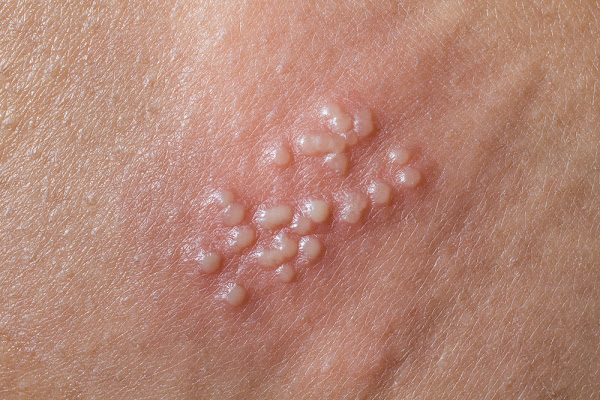Recurrent herpes genitalis is a common manifestation of herpes simplex virus type 2 (HSV-2) infection, although herpes simplex virus type 1 (HSV-1) may also be involved. Following the primary episode, HSV establishes lifelong latency in the sacral dorsal root ganglia and can reactivate periodically, leading to recurrent genital lesions. Proper understanding of the clinical course, triggers, and treatment strategies is essential for optimal patient care.

Causes and Triggers of Recurrent Genital Herpes
Reactivation of HSV from latency is influenced by several internal and external factors, including:
- Physical or emotional stress
- Illness or fever
- Hormonal changes (e.g., menstruation)
- Ultraviolet light exposure
- Immune suppression
- Surgical trauma
Each episode involves viral reactivation, migration along sensory neurons, and replication at the skin or mucosal surfaces, resulting in symptomatic or asymptomatic viral shedding.
Pathophysiology of Recurrent HSV Infection
The latent HSV genome remains within the neuronal nuclei, avoiding immune detection. Periodically, the virus reactivates and travels down the axon to the epithelial tissues, causing lesions or asymptomatic shedding.
Clinical Presentation of Recurrent Herpes Genitalis
Recurrent herpes genitalis tends to have milder symptoms compared to the primary infection. Common clinical features include:
- Localized genital pain, itching, or burning
- Grouped vesicular lesions that may ulcerate
- Tender inguinal lymphadenopathy
- Systemic symptoms (fever, malaise) are rare in recurrences
Prodromal symptoms such as tingling or shooting pain along the legs or buttocks often precede lesion appearance by hours to days.
Diagnostic Strategies for Recurrent Genital Herpes
The diagnosis of recurrent genital herpes relies on both clinical recognition and laboratory confirmation:
- Viral Culture: Specific but requires active lesions and has reduced sensitivity during recurrences.
- Polymerase Chain Reaction (PCR): Highly sensitive and specific; detects viral DNA even in low quantities.
- Direct Fluorescent Antibody (DFA) Testing: Rapid but less sensitive than PCR.
- Type-Specific Serology: Useful in cases with atypical presentation or absent lesions, distinguishing HSV-1 from HSV-2 infection.
Testing is recommended for patients with recurrent lesions, new sexual partners, or when management decisions depend on confirming the diagnosis.
Management of Recurrent Herpes Genitalis
Episodic Antiviral Therapy
Prompt initiation of antiviral therapy at the onset of prodromal symptoms or lesions can significantly shorten the duration and severity of outbreaks.
- Acyclovir 800 mg orally three times daily for 2 days
- Valacyclovir 500 mg orally twice daily for 3 days
- Famciclovir 1000 mg orally twice daily for 1 day
Suppressive Antiviral Therapy
In patients experiencing frequent recurrences (≥6 episodes per year) or significant psychological distress, daily suppressive therapy reduces the frequency and severity of outbreaks and decreases transmission risk.
- Acyclovir 400 mg orally twice daily
- Valacyclovir 500 mg to 1 g orally once daily
- Famciclovir 250 mg orally twice daily
Lifestyle Modifications and Supportive Measures
Enhancing immune resilience and minimizing triggers can assist in reducing the frequency of recurrences:
- Stress management techniques (e.g., mindfulness, counseling)
- Healthy diet and regular exercise
- Adequate sleep hygiene
- Avoidance of known personal triggers
- Safe sexual practices to prevent transmission during asymptomatic shedding
Patient education about the chronic nature of the infection and psychological support are crucial components of holistic care.
Preventive Strategies for Recurrent HSV Infection
Preventing recurrences and transmission includes a combination of pharmacologic and behavioral approaches:
Antiviral Suppression and Transmission Reduction
Suppressive antiviral therapy not only reduces clinical outbreaks but also significantly decreases asymptomatic viral shedding, thereby lowering transmission rates.
Condom Use
While not entirely preventive, consistent condom use reduces the risk of transmission, particularly in individuals with frequent recurrences.
Partner Communication and Testing
Open discussion with partners regarding HSV status and risk mitigation strategies fosters safer sexual practices and informed decision-making.
Complications of Recurrent Herpes Genitalis
While recurrent episodes are generally self-limited, complications can arise:
- Psychosocial Impact: Depression, anxiety, and relationship difficulties.
- Herpetic Whitlow: HSV infection of the fingers through autoinoculation.
- Proctitis: Particularly in individuals engaging in receptive anal intercourse.
- Neonatal Herpes: Severe consequences in newborns when maternal transmission occurs during childbirth.
Preventive measures and appropriate antiviral management can minimize the risks of such complications.
Future Directions in HSV Research and Treatment
Ongoing research endeavors seek to develop more effective vaccines and novel antiviral agents targeting latent HSV reservoirs. Therapeutic vaccines and gene-editing technologies such as CRISPR offer future promise in achieving functional cure or long-term suppression.
Recurrent herpes genitalis remains a lifelong condition marked by episodic reactivations. Through evidence-based antiviral therapy, lifestyle interventions, and preventive strategies, we can markedly reduce the burden of disease, improve patient quality of life, and curb transmission rates. Continued advances in research are expected to refine our management and potentially alter the future landscape of herpes care.